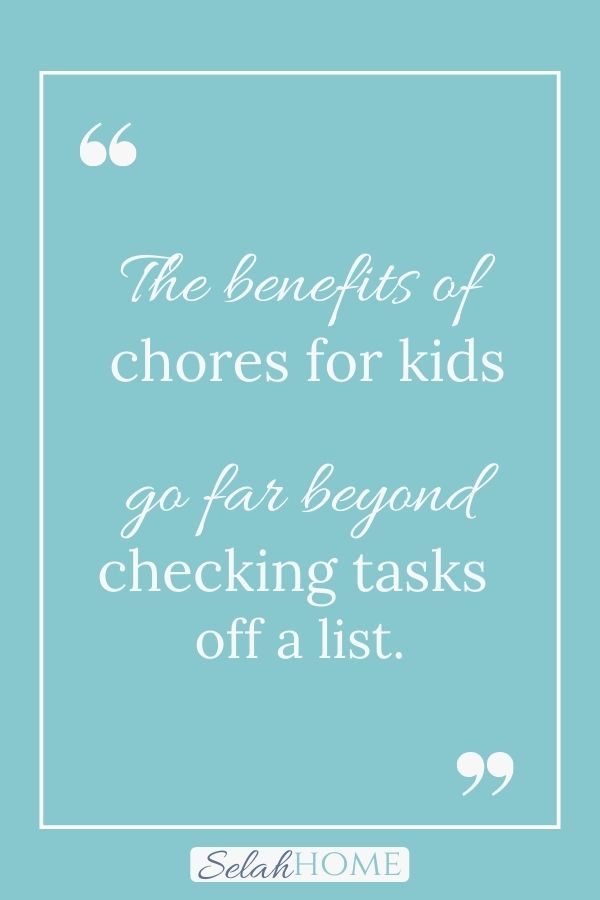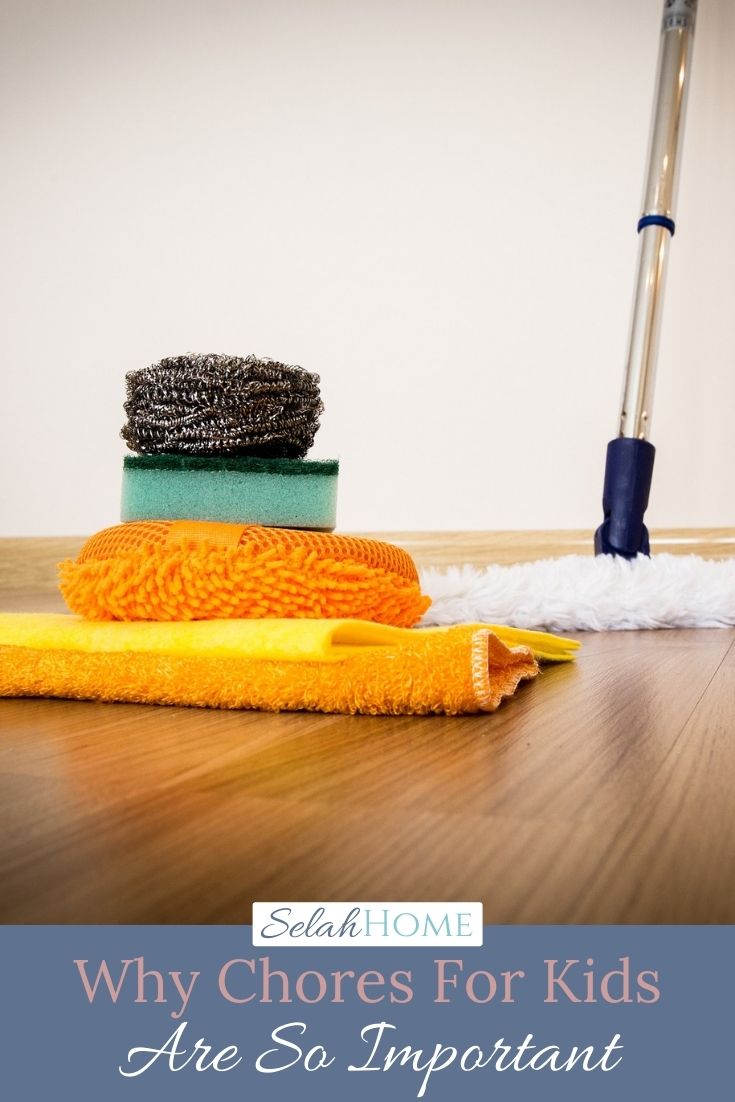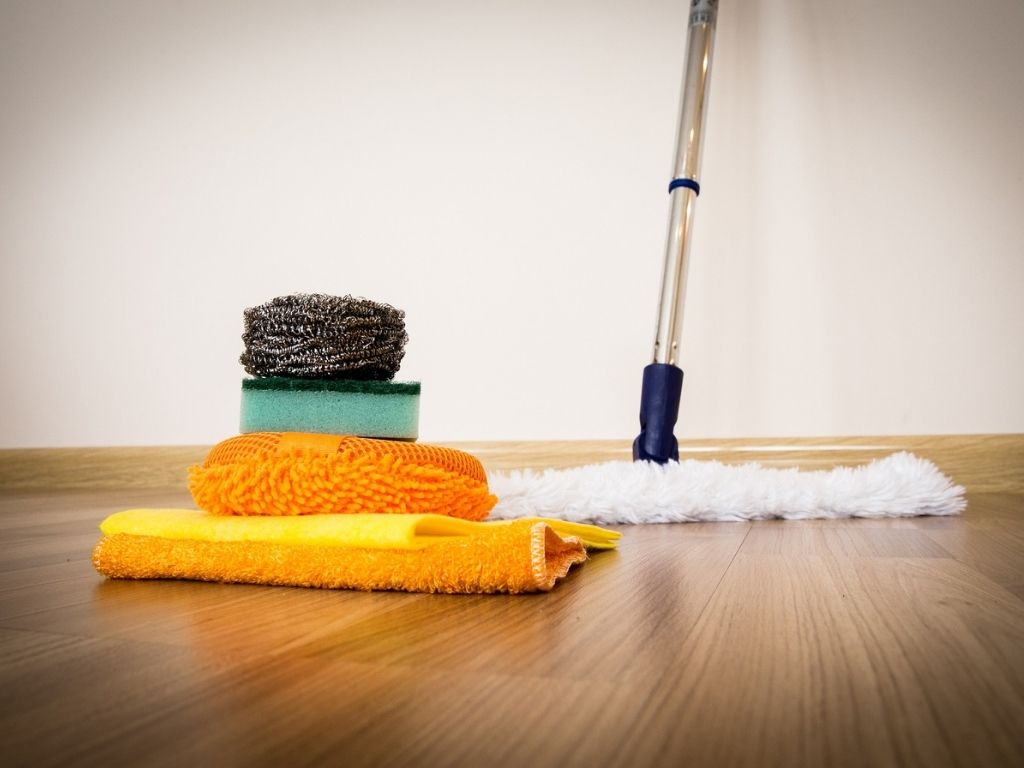It’s their least favorite part of the week.
We call it “cleaning day” at our house. And it always gets big eye rolls from my kids every time it’s mentioned.
But, that’s okay.
Because I know something they don’t.
I can see what’s going on behind the scenes. I understand the benefits of doing household chores go far beyond checking tasks off a list.
The many life lessons, growth in character, and simple habit training that happens every time they complete their weekly chores is worth the effort it takes to get them accomplished.
Coming up with a plan…
I put quite a bit of thought into how our family wanted to go about chores and allowance before our kids were even out of diapers.
I asked friends, searched online, and reflected on my own childhood. And finally, my husband and I came up with a plan we believed would be successful.
We decided our girls would have age-appropriate chores they would be required to complete each day and week.
We explained it to them this way-each member of our family had a responsibility to help the house run efficiently. Those responsibilities all looked different, but everybody was required to pitch in.
Putting that plan into action…
The chores have varied over the years, depending mostly on age. We started with very simple chores early on. And upped the difficulty level as they got older.
Currently, the daily responsibilities of our kids include cleaning their rooms, making their beds, laying our their clothes for the next day, packing snacks and backpacks for school, depositing dirty clothes in the laundry bin, clearing their own dishes off the table after every meal, wiping off the table after meals, and sweeping the kitchen floor each evening.
Each week, they’re expected to put away all their clean clothes, help keep the main areas of the house tidy, and remove sheets from their beds for washing.
These are all chores we expect them to do without getting paid.
However, we also wanted to teach our kids from an early age how to manage money well. And we felt it was important for them to “earn” money rather than just have it given to them.
So, they also have weekly responsibilities that we pay them for. We call them “jobs.” Every week, they are each assigned one job to complete. Right now, those tasks include vacuuming, dusting, scrubbing sinks, emptying trashcans, sweeping off the deck or front porch, or cleaning the shower.
Money management lessons…
When we first implemented this chore/job system, we also taught them what to do with their new-found income. Each child gets paid fifty cents for each completed job.
And each girl has three jars sitting on her dresser. Those jars are labeled tithe, save, and spend. After every “payday,” one nickel goes in the tithe jar and one in the save jar. The rest they get to put in their spend container.
On Sundays, they take the money from their tithe jar to church. Every so often, we take the save jar to the bank and deposit the change into their savings account. And they can use the money from the spend jar anytime they like!
This helps us teach our kids about money management, while also helping them build a strong work ethic. It’s easy to see how the benefits of doing household chores can encompass a whole lot more than might be assumed.
But here’s what I never considered way back when they were in diapers…The jars are cute and the system is fairly easy to manage. But the “building a strong work ethic” part…that’s no easy task!
Want to learn more about growing character in your kids? Check out “The Value of Building Perseverance for Kids.”
A perfect opportunity…
Young kids naturally love to help. And my own children were no exception to that rule.
The idea of acting “big” and helping around the house is a fun and engaging idea. Plus, the earlier you can instill those kinds of good habits, the better.
Because as anyone with older kids knows…the novelty wears off.
The chores become less enjoyable and the complaining begins. And while that can make you want to throw in the towel and quit…don’t. Because the really valuable lessons lie just ahead.
But first things first…how do you actually implement chores?
It’s all in the training…
The first challenge in making chores a regular part of your family routine is the time it takes to train kids on how to do those chores well.
You can’t just expect to give directions once or twice, point them in the direction of the broom, and expect all to be well!
As with most things in parenting, teaching kids about chores takes a whole lot of time and patience.
One of the first chores my kids had was unloading the dishwasher. I remember spending a good chunk of time painstakingly training them how to safely remove and put away the dishes.
It took countless repetition before I felt confident enough to release them to do the task independently. Even then, I kept a watchful eye throughout the process.
And as they get older the need for training doesn’t go away. Not too long ago, I taught my oldest how to vacuum correctly. That process involved lots of modeling, repeated practice, and gradual release of responsibility too.
Or to put it a different way…none of this happens overnight!
But all that diligence pays off. My kids put away dishes, vacuum, and a whole host of other things like pros now!
The benefits of doing household chores are definitely worth all those hours of training.
Making age-appropriate choices…
The next important thing to remember when assigning chores is to pick tasks that are appropriate for your child’s age and developmental level.
A three-year-old is not ready to wield a heavy-duty vacuum. And a ten-year-old is capable of far more than wiping off the kitchen table.
It’s important to think carefully about what your child can realistically accomplish and then assign chores accordingly.
I mentioned my kids started off unloading the dishwasher. But even that didn’t happen all at once. First, they were assigned to only take out and put away items that weren’t breakable.
As they became competent at that, I taught them how to carefully remove the glass items and just stack them on the counter. I put those things away myself.
And as their confidence and skills grew, they graduated to actually putting the glass stuff away too-standing on a chair to reach cabinets that were too high.
Kids are often capable of far more than we give them credit for. A three-year-old CAN make their bed. A nine-year-old CAN vacuum an entire house. A twelve-year-old CAN cook dinner.
Those tasks might not be done perfectly. But perfection isn’t the end goal anyway.
Start small and go from there. But don‘t underestimate your kids.
Need a list of chore ideas? Check out “A Complete List of Chores for Kids By Age.”
Keeping everything organized…
Another vital piece of the chore system is figuring out a practical way to put it all together. There are tons of chore charts and other helpful resources out there to keep you and your kids organized.
(Find my favorite one here.)
Regardless of what system you choose, you DO need a plan. Without one, you’re much less likely to see the many benefits of doing household chores.
I know from experience…not having an organized approach leads to a whole lot of nagging and reminding.
It also puts the weight of responsibility for completing chores solely on the parent. Which doesn’t support the growth of responsibility we’re shooting for!
Encouraging a positive attitude…
So, now that you have an idea of how to start practically implementing chores in your home, let’s move on to those “valuable life lessons” I mentioned earlier.
A big hurdle in chore training is overcoming negativity from your kids. They may be excited to start. And that feeling might hang around for a while.
But most kids will naturally start to find chores more burdensome than enjoyable. Many will begin to complain and try to work their way out of completing tasks.
Or simply “forget” to do chores all together.
And while all of that is exhausting and frustrating for parents, it’s also a golden opportunity to build character in your kids. It’s where the benefits of doing household chores go beyond the tangible and begin to reach into the hearts of your kids.
Because life is full of hard things And lots of stuff we simply don’t want to do.
Our children need to know how to persevere past their feelings and get the job done.
Even more importantly, they need to know how to complete that unwanted task with a good attitude.
Their lives will be happier and more fulfilling if they learn that lesson at a young age.

So, be intentional about training character while you’re teaching how to do chores.
In our house they’re consequences for chores left undone. When it comes to the jobs they get paid for, pay can get docked for a bad attitude.
Or they can miss out on the “promotion” to a more desired job or a possible “pay raise” due to grumbling, complaining, or a lack of effort.
And we have one very important, non-negotiable rule…work is ALWAYS done before play.
The benefits of doing household chores…
To be honest, attitudes during chore time are still a work in progress at our house. My kids have come a long way. But there’s still a whole lot of room for growth.
Regardless, here’s something I know for sure…much more is happening than simply checking off their to-do lists.
With every roll of the eyes when “cleaning day” is mentioned…Each time a consequence is delivered for not following through…Every conversation about perseverance…And each reward that’s given out for a job well done…
They all point toward a greater goal. These benefits of doing household chores will last far beyond this season of training.
Kids with a strong work ethic that know the meaning of perseverance. Attitudes that don’t give up when things get hard or don’t go as planned.
Children that understand how to stay positive in the face of adversity. And are capable of pushing past their emotions to accomplish the task at hand.
Kids that can find joy in unexpected places. And know the feeling of satisfaction that comes with a job well done.
They might not know it now…but it’s so much more than cleaning day.

Have you seen the benefits of doing household chores in your own home? Do you have any tips or tricks that work for your family? Please share in the comments below!






Leave a Reply